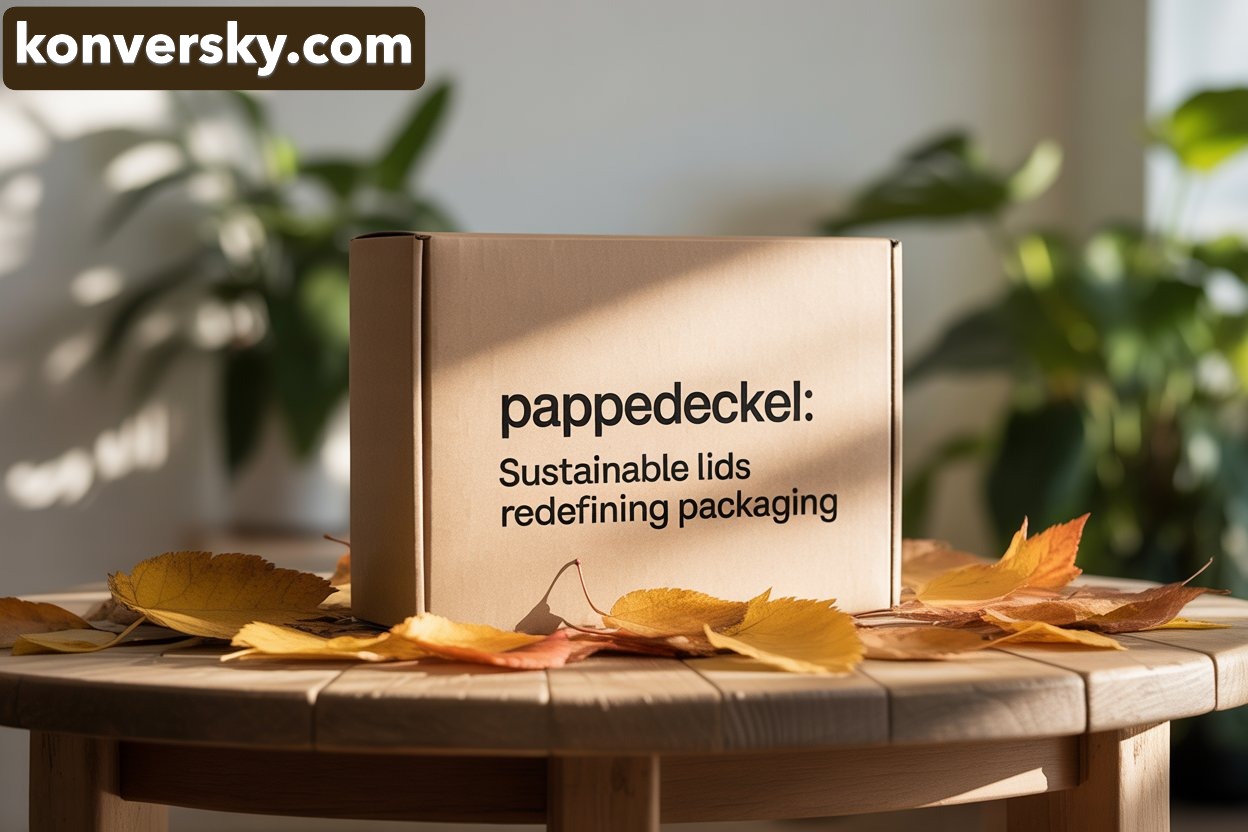Introduction
Pappedeckel, a simple cardboard lid, has quietly transformed everyday packaging. Its lightweight yet sturdy design makes handling easy while effectively protecting drinks and meals. In today’s market, businesses and consumers increasingly seek solutions that combine convenience with responsibility.
Sustainability now drives modern packaging trends. Companies are actively moving away from single-use plastics toward materials that minimize environmental impact. Pappedeckel fits seamlessly into this shift, offering a practical and eco-friendly alternative without compromising functionality.
Traditional plastic lids contribute heavily to pollution, littering streets, oceans, and landfills worldwide. By choosing Pappedeckel, businesses and households reduce plastic dependence while maintaining product safety. Small changes like these inspire greener habits, encouraging responsible practices and promoting a cleaner, healthier planet.
Moreover, Pappedeckel demonstrates that sustainable choices do not require compromising on quality. Its durability and versatility make it a trusted solution for modern packaging challenges, supporting both everyday convenience and long-term environmental responsibility. By adopting Pappedeckel, consumers also actively participate in the global push toward eco-friendly living.
What is a Pappedeckel?
A Pappedeckel is a cardboard lid designed to cover and protect containers. Its lightweight, practical, and environmentally conscious design makes it ideal for cafes, restaurants, and homes.
These lids come in various shapes, including round, square, and rectangular forms. Most are crafted from recycled or biodegradable paperboard, often enhanced with thin moisture-resistant coatings. This ensures durability without sacrificing eco-friendliness.
Primarily, Pappedeckel protects food and beverages during transport and storage. It prevents spills, maintains freshness, and retains the temperature of both hot and cold items. Combining convenience with sustainability, Pappedeckel reduces plastic usage and supports eco-conscious packaging across industries.
Additionally, the adaptability of Pappedeckel makes it suitable for a wide range of container sizes and designs. Businesses can select lids that perfectly match their product dimensions, ensuring functional efficiency while maintaining environmental responsibility. This adaptability also enables creative packaging solutions for specialty products, enhancing both usability and presentation.
Historical Background and Evolution
Cardboard lids have been around for decades, but Pappedeckel gained notable recognition in Germany. Early innovators sought practical alternatives to plastic for coffee shops and bakeries, where disposable lids were commonly used.
As environmental awareness grew, both businesses and consumers began favoring lightweight, biodegradable packaging for everyday products. Neighboring European countries quickly adopted Pappedeckel, sparking eco-conscious packaging trends across the continent.
Over time, the market shifted from plastic to cardboard lids. Increased consumer education, sustainability campaigns, and stricter environmental regulations fueled this change. Today, Pappedeckel symbolizes responsible packaging, balancing convenience with eco-conscious design. It has inspired similar initiatives worldwide, showing that small changes can make a meaningful environmental difference.
The evolution of Pappedeckel reflects society’s growing concern for environmental sustainability. As consumers demand greener alternatives, cardboard lids have become an essential part of modern, responsible packaging practices. Their popularity also demonstrates that environmentally friendly solutions can coexist with commercial efficiency and aesthetic appeal.
Key Features and Benefits
Pappedeckel offers multiple advantages that make it a modern packaging favorite. The lids are biodegradable, recyclable, and compostable, reducing waste and supporting sustainable practices.
Despite their lightweight structure, these lids are surprisingly durable. They protect food and beverages, prevent spills, and maintain freshness throughout transport and storage.
Businesses also benefit from customization options. Logos, colors, and branding designs can be printed directly on the lids, enhancing visibility and reinforcing eco-conscious branding. They are cost-effective and simple to use, combining sustainability, durability, and marketing potential in a way that plastic alternatives cannot match.
Furthermore, Pappedeckel provides flexibility across industries. Cafes, restaurants, and artisanal producers can select lids suited for their packaging needs while maintaining environmental responsibility. This combination of practicality and sustainability positions Pappedeckel as an ideal choice for modern packaging solutions. The versatility extends to creative projects, educational kits, and even promotional events where eco-conscious presentation matters.
Applications Across Industries
Pappedeckel is widely used across multiple sectors. In the food and beverage industry, coffee cups, takeaway meals, and dessert containers benefit from its protective and eco-friendly properties.
In households, Pappedeckel lids are practical for storage jars, organizing small items, and DIY projects. They provide convenience while reducing reliance on disposable plastics.
Beyond food, these lids are used in cosmetics, artisanal goods, and small product packaging. Creative individuals integrate them into crafts, wall art, and home décor. This versatility ensures widespread adoption, supporting sustainability and functionality across diverse industries.
By combining utility and design, Pappedeckel caters to both professional and personal needs. Its adaptable nature allows businesses and consumers to enjoy convenience without environmental compromise. The growing trend of creative packaging also highlights how Pappedeckel adds value beyond simple protection, making products visually appealing and environmentally responsible.
Environmental Impact
Switching to Pappedeckel significantly reduces plastic waste and limits landfill accumulation. By offering a biodegradable alternative, it encourages greener consumer habits and cleaner surroundings.
The production of cardboard lids also lowers the carbon footprint compared to conventional plastics. Less energy and fewer fossil fuels are required, reducing overall environmental strain.
Pappedeckel supports the circular economy by being recyclable and compostable. Businesses and households making this simple choice contribute to eco-conscious practices, demonstrating that everyday packaging can meaningfully impact environmental preservation.
Moreover, the adoption of cardboard lids fosters awareness about sustainable consumption, encouraging consumers to reconsider their reliance on single-use plastics and opt for eco-friendly alternatives in daily life. These lids serve as small yet tangible steps toward large-scale environmental benefits.
Innovations and Design Trends
Modern Pappedeckel lids have evolved to meet growing consumer expectations. Advanced coatings improve moisture resistance, ensuring durability for both hot and cold items.
Custom printing allows brands to convey messages, logos, and designs directly to consumers. This combination of visual appeal and eco-consciousness enhances marketing impact while remaining sustainable.
Smart packaging trends are emerging, including QR codes, eco-certifications, and reusable options. Designers focus on usability, aesthetics, and functional improvements to meet modern needs, making Pappedeckel appealing for both practical and promotional purposes.
These innovations highlight that sustainable products can also be creative and visually attractive, bridging the gap between functionality, branding, and environmental responsibility. In addition, the integration of modern technology into packaging enables businesses to provide consumers with educational and interactive experiences.
Challenges and Considerations
Despite their advantages, Pappedeckel lids have limitations. Moisture sensitivity can affect durability, particularly with hot or wet foods and beverages.
Storage and bulkiness can pose logistical challenges. Cardboard lids require more space than thin plastic alternatives, and initial costs may be higher, demanding careful planning.
Consumer education remains crucial. Awareness campaigns ensure shoppers understand sustainability benefits, proper disposal methods, and the long-term environmental impact of adopting eco-friendly alternatives. Businesses play a key role in informing consumers and promoting responsible usage.
Addressing these challenges ensures that Pappedeckel adoption achieves maximum environmental benefit without compromising practicality or convenience. Thoughtful implementation can overcome these hurdles while boosting public trust in sustainable packaging.
Future Outlook
The sustainable packaging industry is poised for rapid growth. As environmental responsibility becomes a global priority, demand for eco-friendly alternatives like Pappedeckel is expected to rise steadily.
These lids can integrate seamlessly into zero-waste initiatives, further reducing environmental footprints. Businesses adopting Pappedeckel demonstrate leadership in sustainability while appealing to eco-conscious consumers.
Opportunities for creative branding and innovative packaging continue to expand. Companies can leverage design, functionality, and sustainability to communicate environmental commitment while attracting modern, conscientious customers. Pappedeckel is positioned to play a central role in the future of packaging. Its potential to combine functionality, design, and environmental care ensures that it will remain relevant for years to come.
Conclusion
Pappedeckel has proven its value in sustainable packaging and modern design trends. Its simple structure hides remarkable utility, combining convenience with environmental responsibility.
These lids provide practical protection while significantly reducing plastic dependence. They empower businesses and consumers to make eco-conscious choices without sacrificing quality or convenience.
Adopting Pappedeckel and similar alternatives encourages meaningful, long-term environmental change. By selecting sustainable packaging today, companies and households contribute to a cleaner, greener, and more responsible future. Small steps, like choosing Pappedeckel, collectively create a lasting positive impact on our planet.

